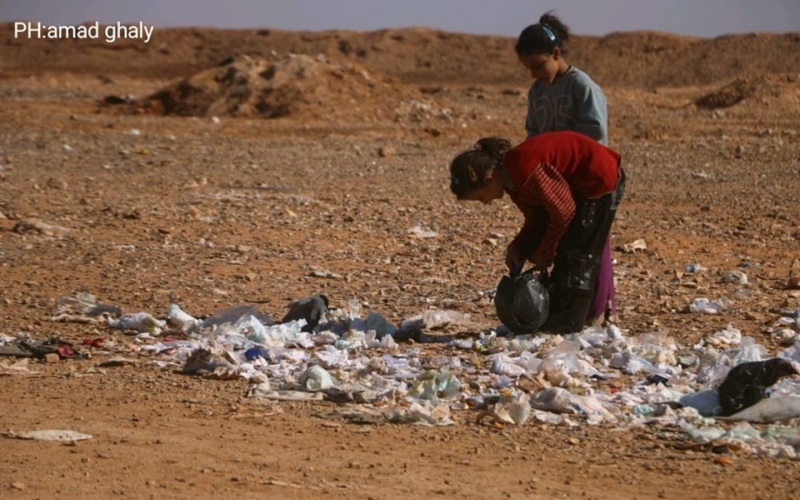Displaced youth sift through rubbish at the Rukban camp in southeast Syria, November 2019 (Amad Ghaly)
The UN has failed again to deliver significant aid to about 13,000 displaced Syrians in the besieged Rukban camp in southeast Syria, according to well-placed sources.
The sources told EA that a UN convoy was supposed to arrive at the end of last week; however, officials were told by camp authorities that the assistance must include some medicine and winter clothes for newborns.
The authorities said in September, after a rare UN delivery to Rubkan, “It promised before to allow food and medicine into the camp but it didn’t fulfill this promise.”
The 13,000 residents had also appealed the UN children’s agency UNICEF to aid 1,500 students, with water purification, medicines for skin diseases from contamination, supplies for treatment of disabled children, and roofing and insulation of schools.
Syria Daily, Nov 15: Residents in Rukban Camp Appeal to UN Over Medicine, Water, Schools
When the convoy neared Rukban, rebels found that the necessary aid was not onboard. The trucks then turned back to Damascus.
UN officials have been asked for comment.
Under Siege and Pressure to Leave
Rukban once held more than 50,000 Syrians, displaced from their homes in 2015 by ISIS assaults.More than 70% of the remaining residents are women and children.
In UN surveys, more than 90% of those in the camp say they wish to return to home areas, but almost all fear detentions, forced conscription, and harassment by the regime.
Assad regime forces cut off the main route into Rukban in October 2018, leading to shortages of food, medicine, and vital supplies, and Damascus has allowed only three UN aid convoys into the camp since January 2018. Activists and residents that even this assistance has been curbed by regime forces refusing or confiscating vital supplies.
Russia has enabled the siege with military support and sustained propaganda and disinformation operations, while the blockade has been compounded by Jordan’s closure of the border in June 2016 after an Islamic State suicide attack.
The US military has refused to provide assistance, fearing a confrontation with Moscow, even though Rukban is within a 55-km (34-mile) security zone around the American base at Tanf on the Iraqi border.
There is only a rudimentary clinic in the camp, staffed by nurses, with basic supplies. Although emergency cases are supposed to be evacuated to Jordan, residents — including pregnant women and women in childbirth — have died from inadequate treatment and the lack of medicine.
See also Syria Daily, June 25: “The Cusp of Death” — No Bread or Flour in Besieged Rukban Camp
“They Should Have Provided Full Aid”
The latest episode began on November 24 when six families decided to leave the besieged camp. A rumour spread that the UN were coming to take away residents. The camp committee issued a statement, “We refuse to let them enter the camp, because they want to force people to return to the areas of the regime, taking advantage of the harsh conditions experienced by the people in the camp from cold and lack of food.”
The camp’s civil administration put out a series of explanation that Septembers aid shipment was exhausted. Since October, residents were living in freezing temperatures with no protection.
The administration expressed concern that the UN’s request for a 10-day stay was primarily to press residents to leave, rather than to deliver assistance: “The question is what they want to do in 10 days and what they hide….They should have provided full aid, especially winterization after they had been away from the camp for 3 months”.
On November 28, the administration confirmed that the convoy had been turned back after bringing in no food or winterization.
Russia-Regime Acknowledge Threat to Residents But Blame US
Russia and the Assad regime responded to the latest development with the complaint that residents had not left Rukban. The Russia-regime committee pursuing the removal blamed the US, declaring — without evidence — that those in the camp are “being held against their will under critical humanitarian conditions”.
Again without any support, the committee implied that it was the Americans who are blocking the convoys: “It is impractical to transfer humanitarian aid to al-Rukban camp area because it does not reach all civilians detained there.”
The committee said the Assad regime is ready to provide basic services” to residents once they arrive in regime-held areas.
In a cynical echo of the statements from the Rukban administration, the Russian and regime officials “warned against the increasing number of victims in the camp in winter, especially that the camp lacks the simplest means to enable its inhabitants to confront the harsh and critical circumstances”.

